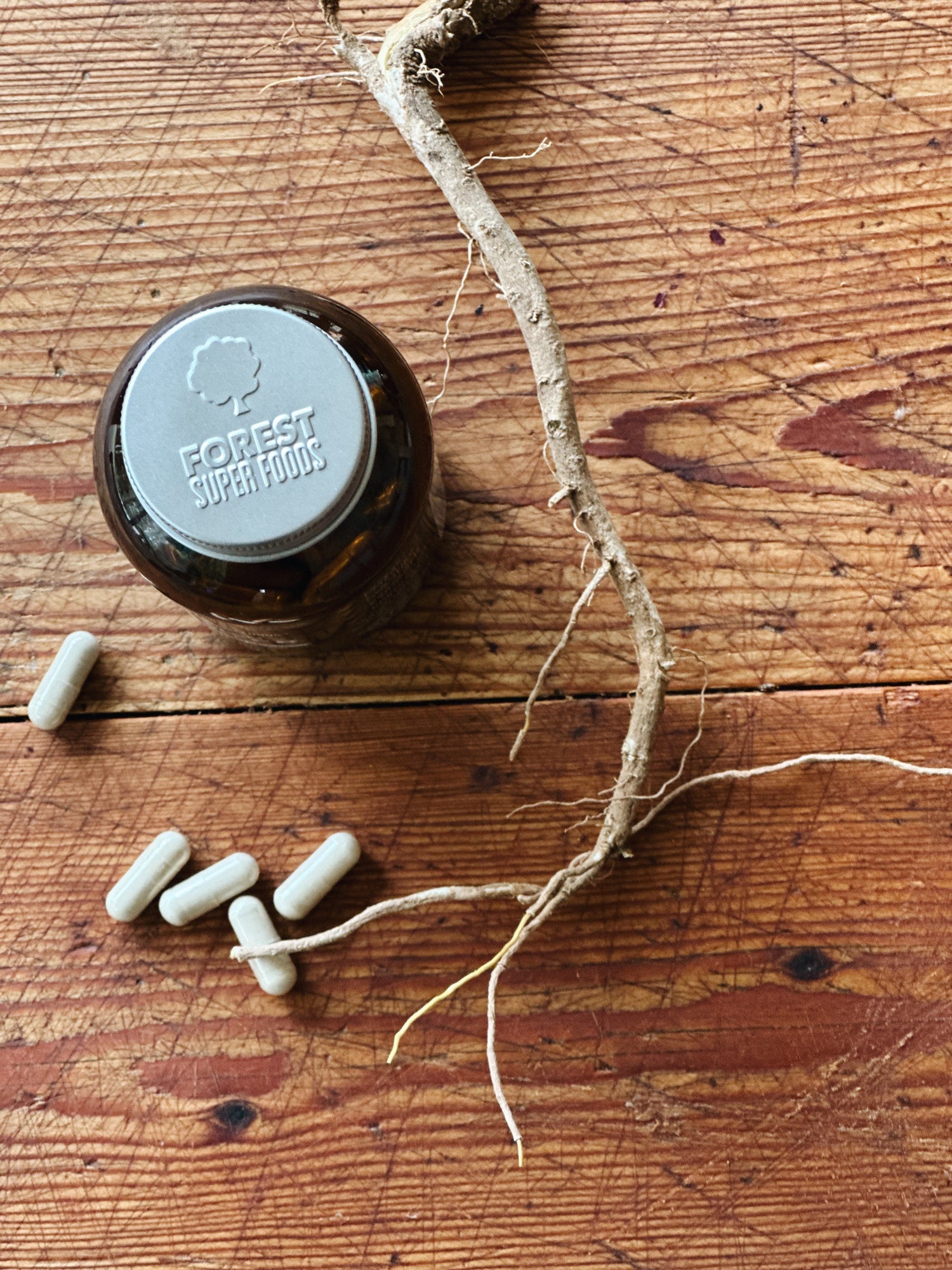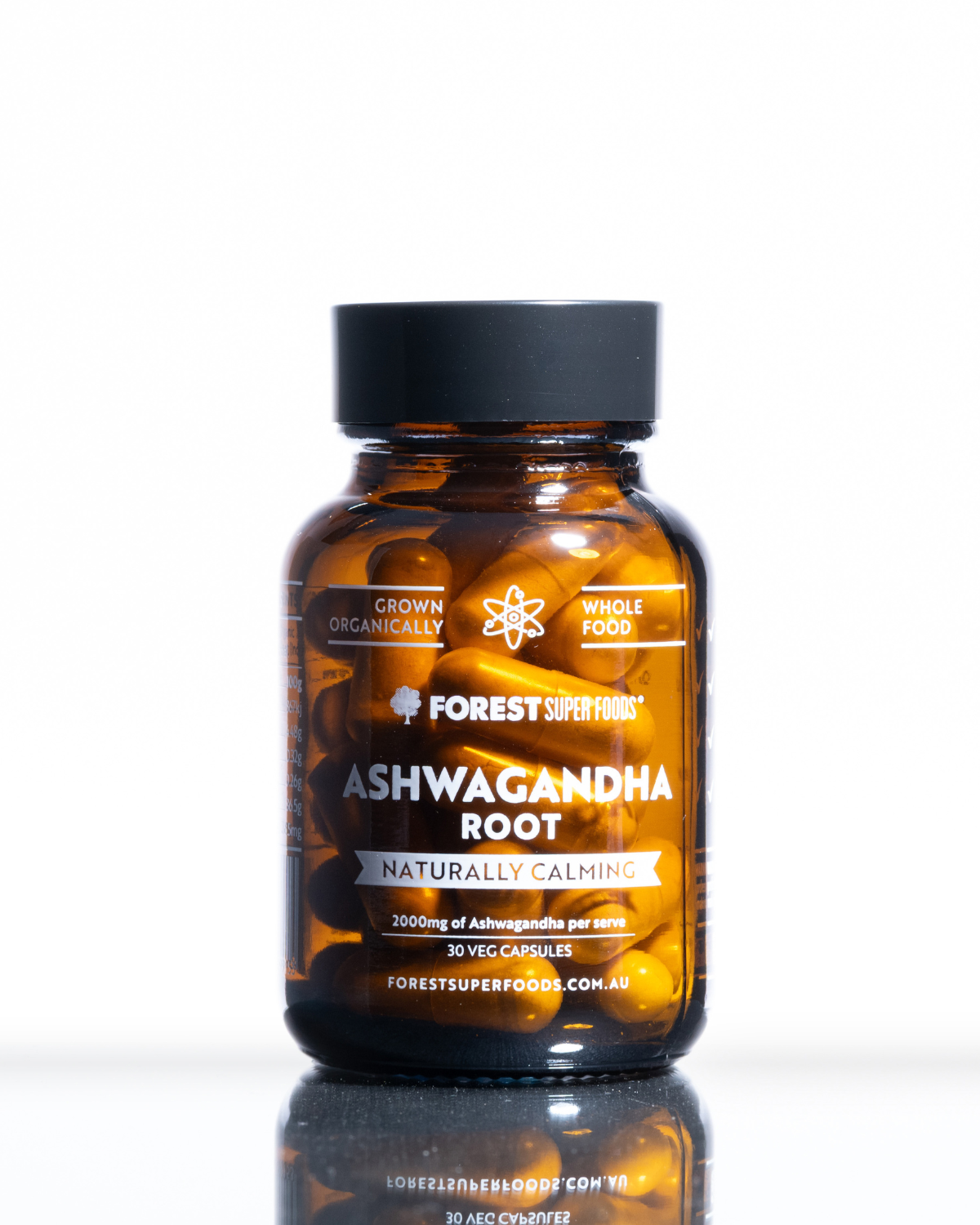Long before we had terms like “biohacking” or “nervous system regulation,” traditional cultures were already exploring how the natural world could soothe an overburdened mind. Among the botanical treasures passed down through time, ashwagandha has remained one of the most quietly powerful.
Harvested from the dry soils of India and North Africa, this gnarled root wasn’t flashy or fast-acting. But its reputation was clear: ashwagandha offered a kind of calm that didn’t sedate—it restored. A steady, enduring calm for the tired, the tense, and the emotionally taxed.
A Nervine Root for the Weary
In Ayurveda, ashwagandha is referred to as a Rasayana—a herb that builds strength over time. More specifically, it's used as a nervine tonic, prescribed for people experiencing chronic stress, low resilience, or ongoing mental fatigue. These weren’t fleeting bouts of nervousness, but the slow-burning tension that erodes energy and equilibrium over weeks or years.
Often blended into warm milk or ghee, ashwagandha was traditionally taken at night to prepare the mind for rest and recovery. Rather than forcing the body to sleep, it gently guided the nervous system toward a state of repair—what we now refer to as parasympathetic dominance.
More Than Myth: What Lies Within the Root
The therapeutic strength of ashwagandha isn’t folklore—it’s chemistry. And while this herb isn’t commonly promoted for its nutrient content, its root is densely packed with bioactive compounds that explain its calming influence.
Withanolides – These are the hallmark molecules of ashwagandha. Structurally similar to steroids, they modulate the brain's stress response, particularly via the GABA system, which plays a central role in relaxation and sleep.
Alkaloids – Compounds like withanine and somniferine act as gentle relaxants, contributing to its mood-soothing effects.
Sitoindosides & Acylsterylglucosides – These support resilience by protecting neural cells from oxidative stress, especially under chronic pressure.
Minerals & Amino Acids – Ashwagandha also offers small amounts of iron, potassium, calcium, and amino acids such as tyrosine, which may help support dopamine production and mental clarity.
What emerges is a plant with both subtle nutrient support and profound phytochemical action—grounded in both tradition and evidence.
Not a Quick Fix, But a Deep One
Unlike pharmaceutical sedatives, ashwagandha doesn’t override the nervous system; it works with it. Its role is not to switch off your stress response entirely, but to rebalance it—to help the body remember how to return to rest after demand.
For people dealing with mild anxiety, chronic tension, or emotional fatigue, ashwagandha provides a gentle yet consistent ally. It's a reminder that true calm isn't something we force—it’s something we cultivate.
純有機 Ashwagandha 膠囊為您的健康和保健提供強大的補充劑。 立即訂購 |

|
常見問題
Ashwagandha 對身體有什麼功效?
Ashwagandha 是一種傳統的適應原,以幫助身體管理壓力而聞名。它可以幫助平衡荷爾蒙、改善能量水平、減少焦慮和提高睡眠品質。有些研究也顯示 Ashwagandha 對大腦功能、耐力和免疫力有幫助。
Ashwagandha 是否允許在澳洲使用?
是的,Ashwagandha 獲准在澳洲作為營養補充品的列名成分使用和銷售。在 Forest Super Foods,我們確保我們的 Ashwagandha 是 100% 有機且符合澳洲標準和法規。
如果每天服用 Ashwagandha 會怎樣?
許多人每天服用 Ashwagandha 來長期緩解壓力、改善情緒和睡眠。大多數的好處都是在數週內逐漸發現的。請務必依照建議劑量服用,如果您正在服藥或正在處理健康問題,請諮詢專業醫護人員。
Ashwagandha 有副作用嗎?
Ashwagandha 一般耐受性良好,但在某些情況下,可能會引起消化不適、嗜睡或荷爾蒙影響。懷孕期間不建議使用,患有甲狀腺疾病或自體免疫失調的人應該先諮詢醫生。
Ashwagandha 會讓您昏昏欲睡嗎?
Ashwagandha 不像是鎮靜劑,但它可以促進放鬆,並有助於減少過度活躍的壓力反應。這種鎮靜效果可讓您在晚上睡得更深,而不會造成白天昏昏欲睡。
Ashwagandha 需要多久才會生效?
大多數人在持續使用 2 到 4 週之內就會開始察覺到效果。不過,這會因您的健康狀況、用量和使用目的 (例如:壓力、睡眠、能量或荷爾蒙) 而異。









發表評論
所有評論在發表前都經過審查。
本網站受 hCaptcha 保護,並適用 hCaptcha隱私權政策 和服務條款。